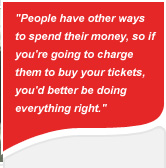




|
|
Professional to run '07 Super Bowl
South Florida hires a professional executive, for the first time, to supervise the planning of a Super BowlBY CHRISTINA HOAG
If there's any community that knows how to put on a Super Bowl, it's South Florida.
Super Bowl XLI on Feb. 4, 2007, will mark the region's ninth football championship -- tying it with New Orleans as the most frequent Super Bowl host city -- but this time around there's a difference: Michael Kelly.
Kelly is the first professional sports executive hired by the South Florida Host Committee to oversee the logistical migraine of managing one of the nation's pinnacle annual sporting events broadcast around the world.
Some 120,000 visitors, including 3,800 journalists, are expected for the game -- organizing it all entails rounding up 7,500 volunteers and raising $5 million in corporate donations, among myriad other tasks.
Kelly's key qualification -- he has done it all before, twice: in Jacksonville earlier this year and in Tampa in 2001. In fact, he holds the league record of being the only person to have organized three Super Bowls in different cities.
''I felt it was important to hire a guy who had experience doing it. We're not going to micromanage this,'' Committee Chairman Rodney Barreto said. ``Now I know I got a pro on the other end who, if I say I have a meeting with the president of BellSouth and this is what I need, he knows what I'm talking about.''
For the past eight Super Bowls played here, county government usually lent a manager from its own ranks to supervise the local preparations. Operational snafus and fundraising faux pas occasionally arose.
During the region's last Super Bowl in 1999, for example, a contretemps arose when Broward County was not mentioned on the official Super Bowl website or map, which included southern Miami-Dade locales such as Kendall but stopped at the county line to the north. Broward contributed $480,000 to the event.
Officials hope to avoid that type of incident this time around.
`DEMANDING CLIENT'
''The NFL is a very, very demanding client,'' said Nicki Grossman, president of the Greater Fort Lauderdale Convention & Visitors Bureau and a Host Committee member. ``Getting a Super Bowl is far more competitive than it used to be and we want every advantage. Mike Kelly is an outstanding advantage. We think our investment in him will result in a very, very smooth Super Bowl.''
South Florida officials, in fact, are currently gearing up their bid to land the 2010 event. The contest among cities to land a Super Bowl is a hot one because the prize is so big, said Kathleen A. Davis, chief executive of consulting firm Sport Management Research Institute in Weston.
''Cities know that it's fabulous revenue from tourism plus intangible added-value from the media exposure,'' she said. ``It's a great occasion to showcase the community.''
In a study, Davis' firm calculated the 1999 Super Bowl brought $240 million into South Florida in direct spending by visitors on items such as hotel rooms, car rentals and food.
It all means that every detail matters. Bureaucrats, as well intentioned as they may be, don't possess the same level of professionalism and relationship with the NFL, said Jim Riordan, director of Florida Atlantic University's MBA in sport management program.
''It's the intangibles a proven professional has,'' he said. ``This sends a great statement to the rest of the country and the NFL that [South Florida] is really serious about this.''
Since the '80s, the NFL has required that cities vying to host the Super Bowl form a host committee to lay down the groundwork beforehand as the event has evolved into much more than a championship match.
''At one time, it was just a 3 ½hour game, but now it's a weeklong experience, in some communities more than a week,'' said spokesman Brian McCarthy.
These days, tens of thousands of ticketless fans show up just to be around the Super Bowl excitement and attend ancillary events such as the NFL Experience, a festival in the stadium for the general public.
That makes coordinating and preparing it all a tough task. ''You have to be a cheerleader for the community and the CEO of a private company that works hand-in-hand with the NFL, the local club, the business community. It's very time consuming,'' McCarthy said.
SCORING A GOAL
``Having someone like Michael who's involved in the planning, the strategy, working out the numerous details is really important. We were very pleased when he was named to the South Florida job.''
Much of the work is carried out by a series of volunteer committees, charged with everything from public relations to hospitality services, but Kelly has to ensure that it all flows smoothly.
One lesson he learned the hard way in Tampa: routing street festivals away from NFL headquarters and the media center. ''They couldn't get into the building for hours,'' he said. ``They were mad, but I think they've gotten over it.''
Kelly stepped into his role in South Florida on July 1, fresh from his experience in Jacksonville, which he says was particularly challenging because the city only has 13,000 hotel rooms and lacked a big entertainment draw.
Solutions: using cruise ships to house NFL personnel and a four-day street festival, Times Union SuperFest.
''He provided a high level of inspirational leadership for this community's first Super Bowl effort,'' said Peter S. Rummel, co-chairman of Jacksonville Super Bowl Host Committee, whose day job is chairman and chief executive of real estate concern The St. Joe Company. ``His experience, energy and ethic was a key reason for our success.''
Co-chairman Tom Petway agreed.
''He deserves the lion's share of the credit,'' said the chairman and chief executive of Zurich Insurance Services. ``You all are lucky to have him.''
Organizing a Super Bowl in South Florida is somewhat easier with a base of 110,000 hotel rooms, plenty of scenic backdrops for TV shoots, lots of non-football stuff to show off to visitors, not to mention locals who are well-accustomed to megaevents.
''There's no community that can put the same package together,'' Kelly said.
Still, any job that involves coordinating some 60 task forces requires tip-top organizational skills and a cool head.
But for Kelly, who as a kid longed to see a live Super Bowl and aspires to be an NFL executive, the job has a dreamlike feel to it. ''I'm very much inspired by it,'' he said.
 |
|
|
|
 |